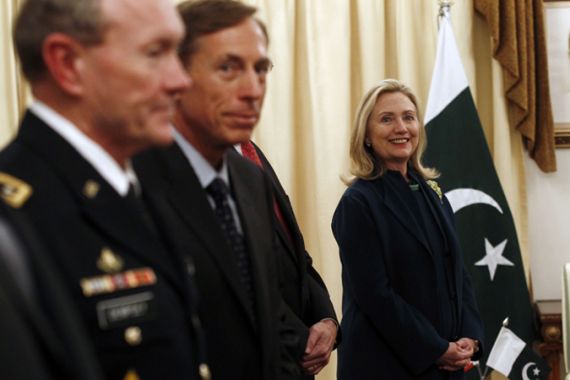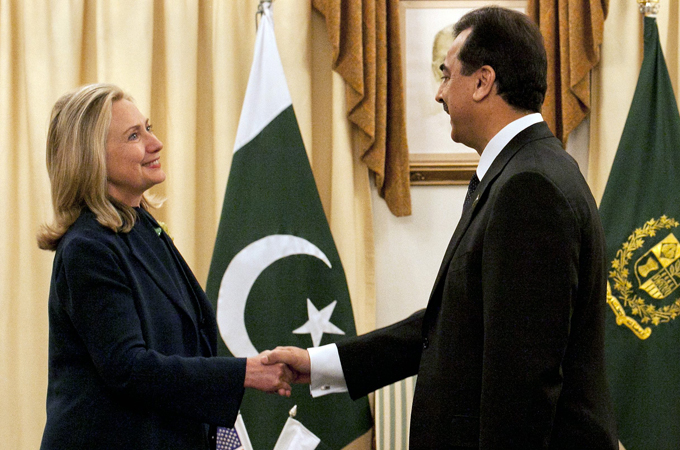Clinton warns Pakistan over border fighters
Islamabad faces pressure from US officials to take action against Taliban-linked groups including Haqqani network.

 |
| Gilani, at right, was delivered a strongly worded message by Clinton at a meeting in Islamabad on Thursday [Reuters] |
Hillary Clinton, on a visit to Islamabad, has given warning that Pakistan must crack down on anti-American fighters or face more unilateral action by the US.
Ties between the US and the South Asian nation have soured in recent months. However, despite the apparent frustrations, the two countries could not give up their relationship, the US secretary of state said on Friday.
“There is frustration on both sides, which I recognise,” Clinton said, calling for “give and take” from both sides.
“We are going to stay the course, and do everything we can to try to overcome the difficulties that we have faced together. Because we both have too much at stake. We cannot walk away.”
Clinton said the US expected Pakistan to deny Afghan Taliban-linked fighters safe havens and saw a “strong” Pakistan
as critical to stability in the region.
“We look to Pakistan to take strong steps to deny Afghan insurgents safehavens and to encourage the Taliban to enter negotiations in good faith,” she said.
“Now we have to turn our attention here on the Pakistani Taliban, the Afghan Taliban, Haqqani and other terrorist groups and try to get them into a peace process but, if that failed, prevent them from committing more violence and murdering more innocent people.”
Clinton delivered a similarly stern message to Yousuf Raza Gilani, the Pakistani prime minister, during a meeting on Thursday that involved military, intelligence and civilian leaders from both sides.
For his part, Gilani urged Clinton to “give peace a chance” as envisaged in a Pakistani conference last month that opposed increasing US pressure for action against the Haqqani group.
High-level delegation
Clinton was scheduled to meet separately Asif Ali Zardari, the Pakistan president, and the foreign minister, Hina Rabbani Khar, on Friday. She was also expected to take part in a give-and-take with the Pakistani public, involving scores of civil society leaders, women and business leaders.
Arriving from Kabul on Thursday, the US delegation held lengthy talks with Ahmad Shuja Pasha, the head of the Inter-Services Intelligence, or ISI; General Ashfaq Kayani, the Pakistani army chief; and Khar.
“It was extremely frank, the discussion was very detailed,” a senior state department official said after the talks.
Al Jazeera’s Kamal Hyder, reporting from Islamabad, said: “Both sides [are] nowhere close to mending differences, which is one of the [reasons for] Clinton’s visit.”
Since abandoning Afghanistan’s Taliban in 2001 and joining the US-led “war on terror”, Pakistan has received billions in US military and civilian aid. But the US’s image among ordinary Pakistanis remains dire.
Fount of troubles
Many Pakistanis, while angry at homegrown violence and at their own fractured leadership, blame the US as the fount of their troubles. A daily diet of anti-American media conspiracy theories feed the climate of mistrust.
Pakistani-US relations have deteriorated dramatically this year over the May 2 American special forces raid that killed Osama bin Laden, the al-Qaeda leader, near Islamabad and accusations over a lengthy US embassy siege in Kabul last month.
The then-most senior US military officer, Admiral Mike Mullen, called the Haqqani network a “veritable arm” of the ISI and accused its spies of being involved in the embassy siege.
Pakistan disagrees with the US strategy, believing that military operations offer limited gains and that now is the time to concentrate on a comprehensive reconciliation ahead of a NATO withdrawal from Afghanistan in 2014.